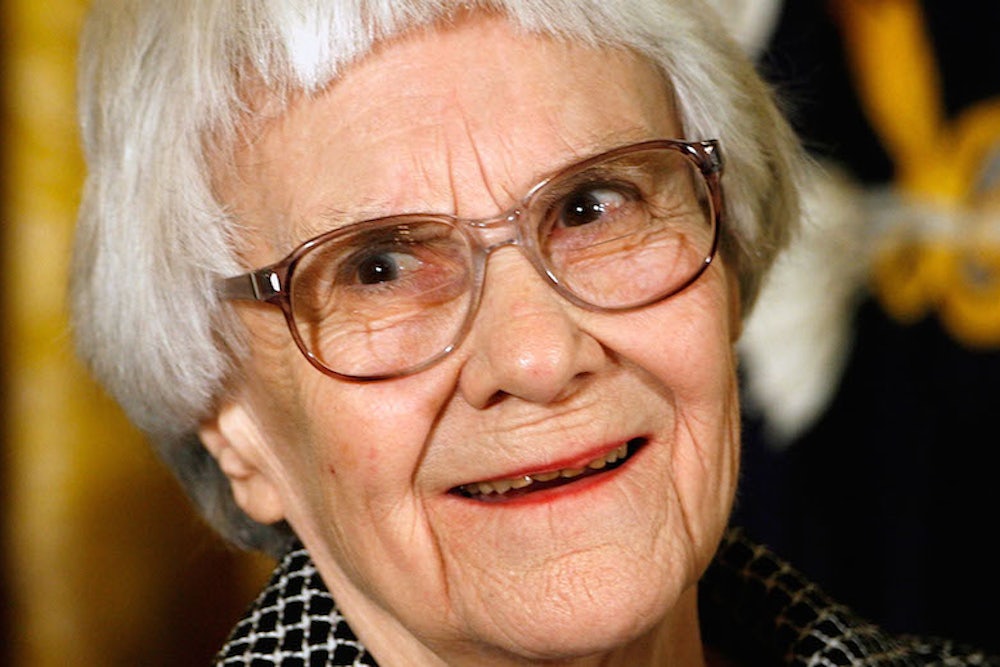Some writers have hit higher peaks than Harper Lee, and most have written more, but no writer has ever been so simultaneously beloved by Oprah’s Book Clubbers, literati, and twelve-year-olds. That ranging affection explains a lot of the squealing that took place online yesterday when HarperCollins announced that they would issue Lee’s second novel—a sequel of sorts to To Kill a Mockingbird—later this summer. The only thing that has been overlooked in the general sequelphilia is the possibly disturbing question of whether Lee’s first-written/second-published novel, Go Set a Watchman, is going to be any good.
It’d certainly be nice if Watchman were a lost masterpiece. Lee’s career—part John Green, part anti-press mysticism, part anguished departure from New York, complicated by issues of gender and privilege—makes her a strikingly modern authorial protagonist. Mockingbird, moreover, is the original YA crossover—Scout is the nine-year-old narrator whose thrillingly clear exploration of complex moral questions worked for readers of all ages. But it’s more important as one of the last muscular case studies for novelistic relevance. In a literary culture whose current protagonists feel that fiction is either dead or an exotic location shot for television, Mockingbird is stunning in its conviction that fiction can reach the heart of a culture and improve it. Equally stunning is its million-copies-a-year success: If you’re a bookish human who has been feeling down about the future relevance of your craft/profession/interest, another Mockingbird would go a long way toward restoring faith.
The only problem is that Go Set a Watchman won’t be To Kill a Mockingbird, and there’s reason to believe it might not be as good. Watchman (in which a twenty-something Scout returns to Alabama from New York) is actually Lee’s first novel, a promising but not-quite-there attempt. Her editors encouraged Lee to keep trying with a new novel based on the transfixing flashbacks to Scout’s childhood: hence To Kill a Mockingbird. Agents and editors have been wrong, certainly, but there are also a lot of first books by later-great writers that we’re very glad to not be reading. Writing a classic in your thirties doesn’t retroactively make your earlier work good.
Similarly troubling is the marginal quality of Lee’s other published work. Her nonfiction is a bizarre set: short pieces mostly concerned with how the world appears to children, characterized by jagged alternation between the merely declarative—“They were a handsome pair, healthy in mind and body, happy in their extremely active lives”—the homespun-yet-striking—“We Americans like to put our culture into disposable containers”—and the wholly Palinesque—“Younger children may not respond in words, but they will drink everything in with their eyes, and fill their minds with awareness and wonder. It’s an experience they will enjoy and remember all their lives.” Deborah Friedell, writing for this magazine in 2006, asked astutely, “Would this have been published if she weren’t Harper Lee?”
Lee has also, apparently, begun and abandoned two post-Mockingbird novels. “I said what I had to say,” she told a bookseller 40 years later. Is it too much to suggest that durable novelists, from Austen to Faulkner, to Morrison and beyond, are united in the impossibility of ever fully saying what they mean? Nothing in Lee’s published work, including Mockingbird, suggests the kind of restlessness or curiosity that powers novels 2 through n.
It might even be that Lee’s real talent (and this, darkly, might be part of Mockingbird’s appeal) is for comfort rather than for curiosity. If Faulkner and Morrison thrive depicting the infectiousness of Southern evil—how one generation of crime can corrupt adjacent lives—Lee is by contrast a genius of quarantine. Mockingbird is a world where white evil consists of a bad jury and a drunk man breaking windows, and is (mostly) amended by the intervention of a hermit, a good father, and a wise policeman, and in which a little white girl arriving to a lynching shames everybody into going home. Drama of injustice or not, Mockingbird is ultimately a closed loop, a flat moral circle ending with a hero father’s unquestioned assertion that “most people are [real nice], Scout, when you finally see them.” Does this hold up after Ferguson?
Friedell describes Lee’s post-Mockingbird nonfiction as the work “of a writer who is unable to stop overhearing herself, who is consumed by the thoughts of how she will sound to the thousands of impressionable people who send her fan mail.” Maybe fame ruined Harper Lee. Or maybe the queer, triumphantly aphoristic nonfiction is just the work of the writer that she always was, one whose undeniably enormous technical and observational gifts were animated only by a peculiar, narrow bravery: a bravery for answering but not for asking, adequate to testify about injustice but not quite to investigate it, and only while swearing frantically to the basic virtue of the small-town South.
If that’s so, Go Set a Watchman’s only chance will be to be as different from Mockingbird as possible. Lee at any stage is a guaranteed writer of voices, visuals, and tender moments, and it’s just plausible that the (promised) more-adult world of Watchman will have opened her vast intelligence to a fuller and more complex consideration of her Southern topic. But if Watchman is only able to offer the Attican parable of Proud Witnessing Virtue, it might be hard to handle: Lee’s readership—most of which probably remembers their affection for Mockingbird better than anything about the actual text—isn’t twelve any more, and just being angry at the bad guys isn’t quite as satisfying as it used to be, and it’s not so clear our fathers can put everything right by reading us a story.
